Search Results for 'kit'
-
AuthorSearch Results
-
February 9, 2026 at 10:51 pm #8057
In reply to: The Hoards of Sanctorum AD26
Perspicacious as she undoubtedly was, Mrs Fennel decisively turned on her heel and marched (as well as she could with her arthritic hip) out of the room with the tray of tea and Karstic Rock Cakes, and limped off in the direction of the kitchen. If they want tea and cakes, they can come to the kitchen. Mars F always kept her kitchen streamlined, orderly and uncluttered for maximum efficiency.
The retreating aroma of freshy baked muffins animated Spirius sufficiently for him to hasten after the refreshment laden maid of all work, and take the tray off her.
Mrs Fennel smirked, rubbing her hands on her apron as if to remove the jumbled derangement from her capable hands.
When Yvoise was perusing the transcription of the security and posterity camera recording later, prior to filing it, she noticed Mars F, and wondered. What could it mean?
January 19, 2026 at 6:51 pm #8051In reply to: The Hoards of Sanctorum AD26
“Lace, did you say?” asked Cerenise with interest. “I must have a look at it. Stench, you say? How very odd. But I want to see it. Fetch me the container while I look for my mask and rubber gloves.”
“I’m not going near it again, I’ll get Boothroyd to bring it,” Spirius replied making a hasty exit.
“I’d have thought you’d have wanted to bottle the smell, Spirius.”
In due course the gardener appeared holding a container at arms length with a pained expression on his face. “Stinks worse than keeg, this does, and I’ve smelled some manure and compost in my time, but never anything as disgusting as this. Where am I to put it?”
Cerenise cleared a space on a table piled with old books and catalogues. “Gosh, that is a pong, isn’t it! Reminds me of something,” she said twitching her nose. “There is a delicate note of ~ what is it?”
“Dead rats?” suggested Boothroyd helpfully, adding “Will that be all?” as he backed towards the door.
As Cerenise lifted the lid, the gardener turned and fled.
“Why, it’s a Nottingham lace Lambrequin window drape if I’m not mistaken!” exclaimed Cerenise, gently lifting the delicate fabric and holding it up to the light. “Probably 1912 or thereabouts, and in perfect condition.”
“Perfectly rancid,” said Yvoise, her voice muffled by the thick towel she had wrapped around her mouth and nose.
“Come and look, it’s a delightful specimen. Not terribly rare, but it wonderful condition. Oh look! There’s another piece underneath. Aha! seventeenth century bone lace!”
Yvoise crept closer. “What’s that other thing? Is that where the smell’s coming from?”
“By Georges, I think you’re right. It’s a bone bobbin. Bone lace, they used to call it, until they started making bobbins out of wood.” Cerenise was pleased. She could get Mrs Fennel to wash the lace and then she could add it to her collection. “Spirius can bottle the bone bobbin and bury it in Bobbington Woods.”
Duly summoned from the kitchen, the faithful daily woman appeared, drying her hands on her apron.
“Pooo eee!” exclaimed Mrs Fennel, “That’ll need a good boil in bleach, will that!”
“Good lord woman, no! A gentle soak in some soap should do it. It won’t smell half so bad as soon as this bone bobbin is removed.”
“Did you say BONE bobbin?” asked Helier from a relatively safe distance just outside the door. “WHOSE bone?”
“By Georges!” Cerenise said again. “Whose bone indeed! Therein lies the clue to the mystery, you know.”
“Can’t you just put it in a parcel and mail it to someone horrible?” suggested Mrs Fennel.
“A capital idea, Mrs Fennel, a politician. So many horrible ones to choose from though,” Yvoise was already making a mental list.
“We can mail the smelly empty box to the prime minister, but we must keep the bone bobbin safe,” said Helier. “And we must find out whose bones it was made from. Cerenise is right. It’s the clue.”
“An empty smelly box, even better. More fitting, if I do say so myself, for the prime minister,” said Mrs Fennel with some relief. At least she wasn’t going to be required to wash the bone and the box as well as the smelly lace.
December 31, 2025 at 5:36 pm #8017In reply to: The Hoards of Sanctorum AD26
“In the name of god amen I Auftreberthe saint of wafhing and water of the parifh of Gloucefter in the county of Gloucefterfhire being weak of body but of sound and perfect mind and memory do hereby commit my soul to the almighty and hereby do make thif my laft will and teftament in manner and form af followeth…”
And so began the reading of Austreberthe’s will to the small gathering assembled in the library of the emporium. Bartholomew Gosnold, the aged barrister, stood behind the large oak desk, clearing his throat frequently and pausing to peer over his spectacles. The library was atwinkle with lamps of a variety of styles and ages, but was otherwise dark and vast in the areas outside of the pools of light. Heavy brocade curtains covered the windows, and a fire glowed in the hearth, for it was winter, the last day of the year, and darkness came early and freshly fallen snow blanketed the town in frigid holy silence.
Despite the fire, it was chilly in the library which was rarely heated, and Cerenise wound her ancient Kashmiri shawl aound her neck and shoulders, pausing to finger the cloth appreciatively. It was an exquisite Kani shawl, woven with intricate floral motifs in warm shades of red and plum, soft as a rabbit. She inched her wicker bath chair closer to the fire, accidentally tipping over a small table and sending the contents of a green glazed Tamegroute bowl skittering across the floor.
Yvoise tutted loudly as she rose from her chair to collect all the buttons and stand the little table back up. Luckily the bowl had landed on the Tabriz rug and hadn’t broken.
Bartholomew Gosnold paused until Yvoise had finished, and then resumed his reading of the will, after first clearing his throat again.
July 16, 2025 at 6:06 am #7969In reply to: The Elusive Samuel Housley and Other Family Stories
Gatacre Hall and The Old Book
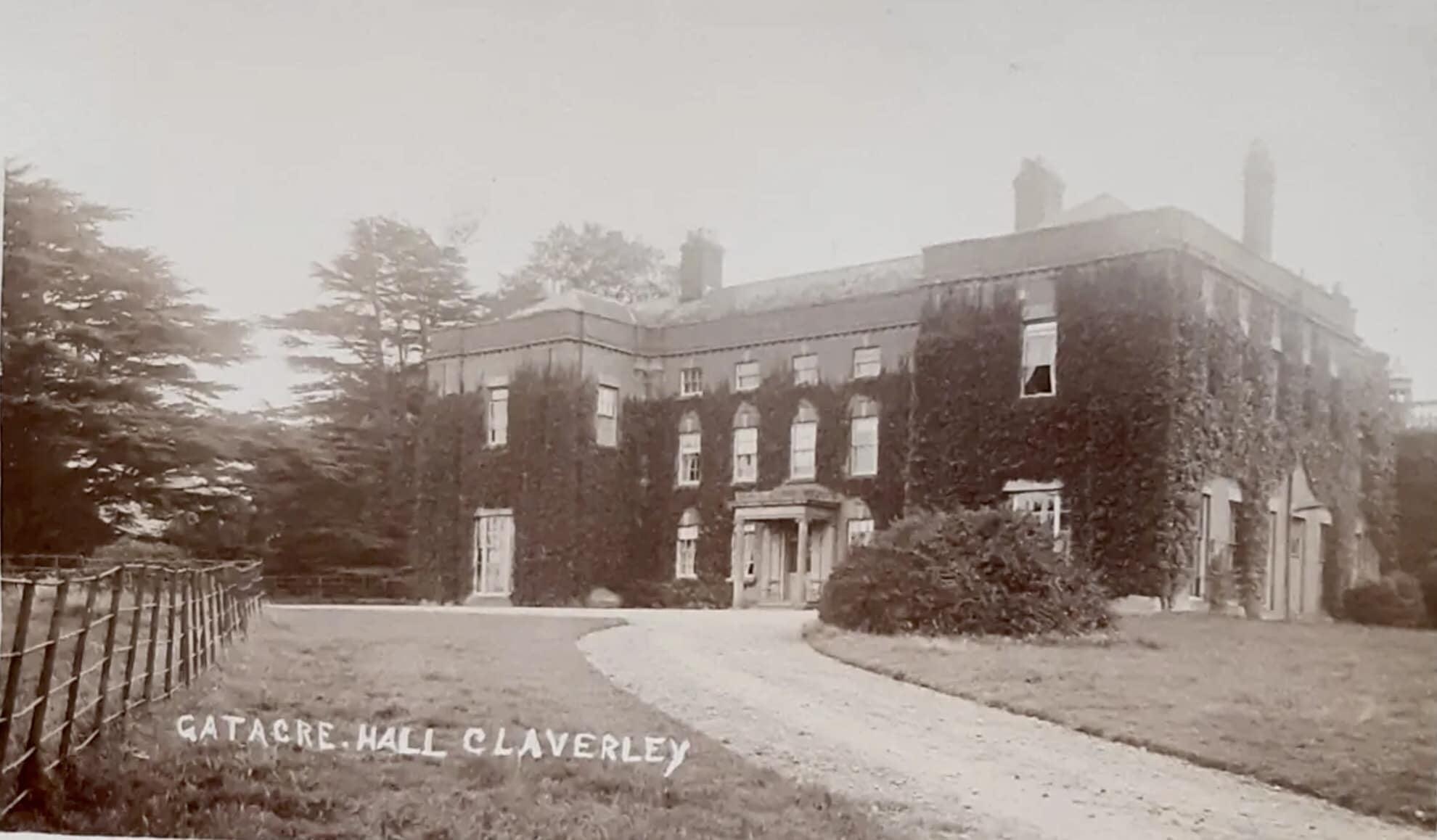
In the early 1950s my uncle John and his friend, possibly John Clare, ventured into an abandoned old house while out walking in Shropshire. He (or his friend) saved an old book from the vandalised dereliction and took it home. Somehow my mother ended up with the book.
I remember that we had the book when we were living in USA, and that my mother said that John didn’t want the book in his house. He had said the abandoned hall had been spooky. The book was heavy and thick with a hard cover. I recall it was a “magazine” which seemed odd to me at the time; a compendium of information. I seem to recall the date 1553, but also recall that it was during the reign of Henry VIII. No doubt one of those recollections is wrong, probably the date. It was written in English, and had illustrations, presumably woodcuts.
I found out a few years ago that my mother had sold the book some years before. Had I known she was going to sell it, I’d have first asked her not to, and then at least made a note of the name of it, and taken photographs of it. It seems that she sold the book in Connecticut, USA, probably in the 1980’s.
My cousin and I were talking about the book and the story. We decided to try and find out which abandoned house it was although we didn’t have much to go on: it was in Shropshire, it was in a state of abandoned dereliction in the early 50s, and it contained antiquarian books.
I posted the story on a Shropshire History and Nostalgia facebook group, and almost immediately had a reply from someone whose husband remembered such a place with ancient books and manuscripts all over the floor, and the place was called Gatacre Hall in Claverley, near Bridgnorth. She also said that there was a story that the family had fled to Canada just after WWII, even leaving the dishes on the table.
The Gatacre family sailing to Canada in 1947:
When my cousin heard the name Gatacre Hall she remembered that was the name of the place where her father had found the book.
I looked into Gatacre Hall online, in the newspaper archives, the usual genealogy sites and google books searches and so on. The estate had been going downhill with debts for some years. The old squire died in 1911, and his eldest son died in 1916 at the Somme. Another son, Galfrey Gatacre, was already farming in BC, Canada. He was unable to sell Gatacre Hall because of an entail, so he closed the house up. Between 1945-1947 some important pieces of furniture were auctioned, and the rest appears to have been left in the empty house.
The family didn’t suddenly flee to Canada leaving the dishes on the table, although it was true that the family were living in Canada.
An interesting thing to note here is that not long after this book was found, my parents moved to BC Canada (where I was born), and a year later my uncle moved to Toronto (where he met his wife).
Captain Gatacre in 1918:
The Gatacre library was mentioned in the auction notes of a particular antiquarian book:
“Provenance: Contemporary ownership inscription and textual annotations of Thomas Gatacre (1533-1593). A younger son of William Gatacre of Gatacre Hall in Shropshire, he studied at the English college at the University of Leuven, where he rejected his Catholic roots and embraced evangelical Protestantism. He studied for eleven years at Oxford, and four years at Magdalene, Cambridge. In 1568 he was ordained deacon and priest by Bishop of London Edmund Grindal, and became domestic chaplain to Robert Dudley, 1st Earl of Leicester and was later collated to the rectory of St Edmund’s, Lombard Street. His scholarly annotations here reference other classical authors including Plato and Plutarch. His extensive library was mentioned in his will.”
There are thirty four pages in this 1662 book about Thomas Gatacre d 1654:

 July 1, 2025 at 9:22 pm #7968
July 1, 2025 at 9:22 pm #7968In reply to: Cofficionados Bandits (vs Lucid Dreamers)
“I feel like I’m talking to myself, Kit,” Amy said but Kit wasn’t listening. “Where is Helper Effy?”
June 27, 2025 at 8:01 pm #7967In reply to: Cofficionados Bandits (vs Lucid Dreamers)
“You’ll never guess what the gazebo landed on! The Lost City of Zed!” Breathlessly, Amy told her father the exciting news of Chico’s successful mission.
“Saddle my horse, Crumpet, we must go at once. The Gazeba must stay there, and we go there for the character building, ” Sir Humphrey replied, struggling to his feet. “Tell everyone to pack.”
“Padre, calm yourself, there’s no rush. Did you just say Gazeba?”
“Of course I said Gazeba, don’t be dense, girl,” Humphrey said irritably, “Your mother was dense.”
I don’t even want to know. Amy shuddered, and went outside to look for Kit.
June 14, 2025 at 8:13 pm #7963In reply to: Cofficionados Bandits (vs Lucid Dreamers)
“Well, I think that proves my point,” remarked Carob with a smirk.
“What do you mean”, Thiram said crossly, which sounded more like a resigned sigh than a question.
“Remember what I said? You can’t order a synchronicity, or expect one. They always just happen when you don’t expect it.”
“She’s right,” Any piped up. “We can’t just sit here waiting for a coincidence. We have to just carry on regardless until one appears.”
“Aunt Amy?” Kit asked, “How do we carry on regardless if we don’t know what our story is yet?”
“What I want to know is this,” Chico said with a twirl of his worry beads, “Who’s coming with me to fetch the gazebo back?” Chico squared his shoulders proudly, glad that his new colourful beads had replaced the urge to spit. He felt in control, a new man. A man to be respected. A leader.
With an elaborate triple reverse double flip of the worry beads, Chico turned and strode purposefully into the sunset, in the direction of the gazebo.
June 11, 2025 at 7:50 pm #7962In reply to: Cofficionados Bandits (vs Lucid Dreamers)
The hat was gone.
Kit stood blinking in the sun, the shape of his new self cooling around the edges like a half-written cookie losing form. Without the cowboy hat, the lasso made less sense. His accent wobbled, then vanished completely. The sunglasses stayed, but now just made everything too dark, even tinted pink.
Behind him, the gazebo creaked again. But no trapdoor this time—only a faint whirring, like a film projector syncing spools.
“It’s reloading,” said Thiram from the sidelines, tapping at something that looked oddly like a pressure-gauged Sabulmantium. “Every time someone hands off a narrative object—like a synch, a hat, a horse even—it updates roles. We’re being cast on the fly.”
Chico looked up from Tyrone, who had snatched one of the Memory Pies and was now attempting to hide the evidence behind a flowerpot. “So… Kit’s not Trevor anymore?”“No,” said Carob, arms crossed. “He’s Trevorless. That identity didn’t bake fully. We have to stabilize it.”
“But with what?” asked Godrick, who had returned carrying a second cocktail, coffee with a glass of water and a slight wry smirk.
Amy, now balancing the cowboy hat on her head as she crouched next to the still-disoriented Padre, called out without turning:
“Bring him another Synch. That’s how it works now, apparently. Hat or otherwise.”
June 11, 2025 at 6:26 pm #7961In reply to: Cofficionados Bandits (vs Lucid Dreamers)
Amy rushed over to Kit when she saw what had happened and said, “Kit, give me your hat!”
Tentatively Kit put his hand on his head and sure enough he felt a hat upon it. Carefully he removed it and wonderingly gazed at the cowboy hat. He loved it! Just looking at the hat was already giving him ideas for his character, newly baked memories were starting to slide in like a tray of chocolate chip cookies on a baking sheet, pulled out of the oven at the perfect golden melting moment.
But Amy wants it! I can’t say no to her, but I want to keep it. It’s my first hat! Kit was close to tears.
“Oh poppet,” Amy said kindly when she noticed his face. Giving him a quick hug she explained. “I only want to borrow it, just to keep the Padre happy. He keeps asking where his hat is. I’ll bring it back as soon as we’ve settled him back at home.”
The releif was immense, and he graciously surrendered the hat to Aunt Amy. “Did you call me Poppet?” he asked. “Because Thiram just called me Trevor.”
“To me, you’ll always be Kit,” Amy said as she rushed back to her father. “See you later, Poppet!” she called over her shoulder.
“What does that mean?” asked Kit, but Amy had gone.
June 11, 2025 at 6:07 pm #7960In reply to: Cofficionados Bandits (vs Lucid Dreamers)
As Chico carried the Memory Pie over to Kit, a breeze shuffled the pages of the script lying abandoned beside the gazebo. No one had noticed it before—maybe it hadn’t been there. The pages were blank. Then they weren’t.
Kit blinked. “Did you just call me Trevor?”
“No,” said Chico. But he looked uncertain. “Did I?”
There was a rumble below them. The gazebo creaked—faint and subtle, like a swedish roll turning in its deep sleep.
Then—click-clac thank you Sirtak.
A trapdoor swung open beneath Kit’s feet. But instead of falling, Kit froze mid-air.
The air flickered. Kit shimmered.
And now they were wearing sunglasses, holding a cowboy lasso, and speaking in a faint Midwest accent.
“Sorry, I think I missed my cue. Where are we in the scene?”
June 10, 2025 at 7:59 pm #7957In reply to: Cofficionados Bandits (vs Lucid Dreamers)
Still visibly shaken, Sir Humphrey blinked up at the canopy. “Is it… raining? Is it raining ants?”
“It’s not rain,” muttered Thiram, checking his gizmos. “Not this time. It’s like… gazebo fallout. I’d venture from dreams hardening midair.”
Kit shuffled closer to Amy, speaking barely above a whisper. “Aunt Amy, is it always like this?”
Amy sighed, pinched the bridge of her nose, and said, “No, sweetheart. Sometimes it’s worse.”
“Right then,” declared Carob, making frantic gestures in the air, as though she’d been sparring the weather. “We need to triangulate the trajectory of the gazebo, locate the Sabulmantium, and get Sir Humphrey a hat before his dignity leaks out his ears.”
“I feel like Garibaldi,” Sir Humphrey murmured, dazedly stroking his forehead.
“Do you remember who Garibaldi is?” Chico asked, narrowing his eyes.
“No,” the Padre confessed. “But I’m quite certain he’d never have let his gazebo just float off like that.”
Meanwhile, Madam Auringa had reappeared behind a curtain of mist smelling faintly of durian and burnt cinnamon.
“The Sabulmantium has been disturbed,” she intoned. “Intent without anchor will now spill into unintended things. Mice shall hold council. Socks will invert themselves. Lost loves shall write letters that burn before reading.”
“Typical,” muttered Thiram. “We poke one artifact and the entire logic stack collapses.”Kit raised a trembling hand. “Does that mean I’m allowed to choose my name again?”
“No,” said Amy, “But you might be able to remember your original one—depending on how many sand spirals the Sabulmantium spins.”
“I told you,” Chico interjected, gesturing vaguely at where the gazebo had vanished over the treetops. “It was no solar kettle. You were all too busy caffeinating to notice. But it was focusing something. That sand’s shifting intent like wind on a curtain.”
“And we’ve just blown it open,” said Carob.
“Yup,” said Amy. “Guess we’re going gazebo-chasing.”
June 10, 2025 at 7:39 pm #7956In reply to: Cofficionados Bandits (vs Lucid Dreamers)
“Solar kettle, my ass,” Chico muttered, failing to resist the urge to spit. After wiping his chin on his tattood forearm, he spoke up loudly, “That was no solar kettle in the gazebo. That was the Sabulmantium!”
An audible gasp echoed around the gathering, with some slight reeling and clutching here and there, dropping jaws, and in the case of young Kit, profoundly confused trembling.
Kit desperately wanted to ask someone what a Sabulmantium was, but chose to remain silent.
Amy was frowning, trying to remember. Sure, she knew about it, but what the hell did it DO?
A sly grin spread across Thiram’s face when he noticed Amy’s perplexed expression. It was a perfect example of a golden opportunity to replace a memory with a new one.
Reading Thiram’s mind, Carob said, “Never mind that now, there’s a typhoon coming and the gazebo has vanished over the top of those trees. I can’t for the life of me imagine how you can be thinking about tinkering with memories at a time like this! And where is the Sabulmantium now?”
“Please don’t distress yourself further, dear lady, ” Sir Humphrey gallantly came to Carob’s aid, much to her annoyance. “Fret not your pretty frizzy oh so tall head.”
Carob elbowed him in the eye goodnaturedly, causing him to stumble and fall. Carob was even more annoyed when the fall rendered Sir Humphrey unconscious, and she found herself trying to explain that she’d meant to elbow him in the ribs with a sporting chuckle and had not intentionally assaulted him.
Kit had been just about to ask Aunt Amy what a Sabulmantium was, but the moment was lost as Amy rushed to her fathers side.
After a few moments of varying degrees of anguish with all eyes on the prone figure of the Padre, Sir Humphrey sat up, asking where his Viking hat was.
And so it went on, at every mention of the Sabulmantium, an incident occured, occasioning a diversion on the memory lanes.
June 7, 2025 at 7:32 am #7955In reply to: Cofficionados Bandits (vs Lucid Dreamers)
The wind picked up just as Thiram adjusted the gazebo’s solar kettle. At first, he blamed the rising draft on Carob’s sighing—but quickly figured out that this one had… velocity.
Then the scent came floating by: jasmine, hair spray, and over-steeped calamansi tea.
A gust of hot air blew through the plantation clearing, swirling snack wrappers and curling Amy’s page corners. From the vortex stepped a woman, sequins ablaze, eyeliner undefeated.
She wore a velvet shawl patterned like a satellite weather map.
“Did someone say Auringa?” she cooed, gliding forward as her three crystal balls rotated lazily around her hips like obedient moons.
“Madam Auringa?” Kit asked, wide-eyed.Thiram’s devices were starting to bip, checking for facts. “Madam Auringa claims to have been born during a literal typhoon in the Visayas, with a twin sister who “vanished into the eye.” She’s been forecasting mischief, breakups, and supernatural infestations ever since…”
Carob raised an eyebrow. “Source?”
Humphrey harrumphed: “We don’t usually invite atmospheric phenomena!”
“Doctor Madam Auringa, Psychic Climatologist and Typhoon Romantic,” the woman corrected, removing a laminated badge from her ample bosom. “Bachelor of Arts in Forecasted Love and Atmospheric Vibes. I am both the typhoon… and its early warning system.”
“Is she… floating?” Amy whispered.
“No,” said Chico solemnly, “She’s just wearing platform sandals on a bed of mulch.”
Auringa snapped her fingers. A steamy demitasse of kopi luwak materialized midair and plopped neatly into her hand. It wasn’t for drink, although the expensive brevage born of civet feces had an irrepressible appeal —it was for her only to be peered into.
“This coffee is trembling,” she murmured. “It fears a betrayal. A rendezvous gone sideways. A gazebo… compromised.”
Carob reached for her notes. “I knew the gazebo had a hidden floor hatch.”
Madam Auringa raised one bejeweled finger. “But I have come with warning and invitation. The skies have spoken: the Typhoon Auring approaches. And it brings… revelations. Some shall find passion. Others—ant infestations.”
“Did she just say passion or fashion?” Thiram mumbled.
“Both,” Madam Auringa confirmed, winking at him with terrifying precision.
She added ominously “May asim pa ako!”. Thiram’s looked at his translator with doubt : “You… still have a sour taste?”
She tittered, “don’t be silly”. “It means ‘I’ve still got zest’…” her sultry glance disturbing even the ants.
June 6, 2025 at 6:02 pm #7954In reply to: Cofficionados Bandits (vs Lucid Dreamers)
Another one! A random distant memory wafted into Amy’s mind. Uncle Jack always used to say GATZ e bo. Amy could picture his smile when he said it, and how his wife always smiled back at him and chuckled. Amy wondered if she’d even known the story behind that or if it had always been a private joke between them.
“What’s been going on with my gazebo?” Amy’s father rushed into the scene. So that’s what he looks like. Amy couldn’t take her eyes off him, until Carob elbowed her in the neck.
“Sorry, I meant to elbow you in the ribs, but I’m so tall,” Carob said pointlessly, in an attempt to stop Amy staring at her father as if she’d never seen him before.
Thiram started to explain the situation with the gazebo to Amy’s father, after first introducing him to Kit, the new arrival. “Humphrey, meet Kit, our new LBGYEQCXOJMFKHHVZ story character. Kit, this is Amy’s father who we sometimes refer to as The Padre.”
“Pleased to meet you, ” Kit said politely, quaking a little at the stern glare from the old man. What on earth is he wearing? A tweed suit and a deerstalker, in this heat! How do I know that’s what they’re called? Kit wondered, quaking a little more at the strangeness of it all.
“Never mind all that now!” Humphrey interrupted Thiram’s explanation.
Still as rude as ever! Amy thought.
“I’ve too much to think about, but I’ll tell you this: I’ve planned a character building meeting in the gazebo, and you are all invited. As a matter of fact,” Humphrey continued, “You are all obliged to attend. If you choose not to ~ well, you know what happened last time!”
“What happened last time?” asked Carob, leaning forward in anticipation of an elucidating response, but Humphrey merely glared at her.
Amy sniggered, and Humphrey shot her a lopsided smile. “YOU know what happened in Jack’s GATZ e bo, don’t you, my girl?”
Where were those random memories when you wanted them? Amy had no idea what he was talking about.
“Who else is invited, Humph? asked Chico, resisting the urge to spit.
“My good man,” Humphrey said with a withering look. “Sir Humphrey’s the name to you.”
Sir? what’s he on about now? wondered Amy. Does that make me a Lady?
“Who else is invited, Padre?” Amy echoed.
Humphrey pulled a scroll tied with a purple ribbon out of his waistcoat pocket and unfurled it. Clearing his throat importantly, he read the list to all assembled.
Juan and Dolores Valdez.
Godric, the Swedish barman
Malathion and Glyphosate, Thiram’s triplet brothers. Mal and Glyph for short.
Liz Tattler
Miss Bossy Pants
Goat Horned Draugaskald“Did I forget anyone?” Humphrey asked, peering over his spectacles as he looked at each of the characters. “You lot,” he said, “Amy, Carob, Thiram, Chico, Kit and Ricardo: you will be expected to play hosts, so you might want to start thinking about refreshments. And not,” he said with a strong authoritarian air, “Not just coffee! A good range of beverages. And snacks.”
Thiram, leaning against a tree, started whistling the theme tune to Gone With The Wind. Tossing an irritated glance in his direction, Carob roughly gathered up her mass of frizzy curls and tethered it all in a tight pony tail. I still don’t know what happened before, she fumed silently. The latest developments where making her nervous. Would they find out her secret?
“You guys,” called Chico, who had wandered over to the gazebo. “It’s full of ants.”
June 6, 2025 at 10:32 am #7953In reply to: Cofficionados Bandits (vs Lucid Dreamers)
Carob was the first to find the flyer. It had been pinned to the banyan tree with a teaspoon, flapping just slightly in the wind like it knew how ridiculous it was.
FIVE HURT IN GAZEBO DRAMA
Local Brewmaster Suspected. Coffee Stains Incriminating.She tapped it twice and announced to no one in particular, “I told you gazebos were structurally hostile.”
Amy poked her head out of the linen drying shed. “No, you said they were ‘liminal spaces for domestic deceit.’ That’s not the same as a health hazard.”
“You ever been in a gazebo during a high wind with someone named Derek? Exactly.”
Ricardo ran past them at an awkward crouch, muttering into a device. “…confirming perimeter breach… one is wearing a caftan, possibly hallucinating… I repeat, gazebo situation is active.”
Chico wandered in from the side trail, his shirt unbuttoned, leaf in mouth, mumbling to Kit. “I don’t know what happened. There was a conversation about frothed chalk and cheese, and then everything… rotated.”
Kit looked solemn. “Aunt Amy, he sat on it.”
“He sat on the gazebo?” Amy blinked.
“No. On the incident.”
Kit offered no further explanation.
From the underbrush, a low groan emerged. Thiram’s voice, faint: “Someone built a gazebo over the generator hatch. There are no stairs. I fell in.”
Amy sighed. “Goddammit, Thiram.”
Carob smirked. “Gazebo’d.”
May 23, 2025 at 9:19 pm #7951In reply to: Cofficionados Bandits (vs Lucid Dreamers)
Disgruntled and bored with the fruitless wait for the other characters to reveal more of themselves, Amy started staying in her room all day reading books, glad that she’d had an urge to grab a bag full of used paperbacks from a chance encounter with a street vendor in Bogota.
A strange book about peculiar children lingered in her mind, and mingled somehow with the vestiges of the mental images of the writhing Uriah in the book Amy had read prior to this one.
Aunt Amy? a childs voice came unbidden to Amys ear. Well, why not? Amy thought, Some peculiar children is what the story needs. Nephews and neices though, no actual children, god forbid.
“Aunt Amy!” A gentle knocking sounded on the bedroom door. “Are you in there, Aunt Amy?”
“Is that at neice or nephew at my actual door? Already?” Amy cried in amazement.
“Can I come in, please?” the little voice sounded close to tears. Amy bounded off the bed to unloock leaving that right there the door to let the little instant ramen rellie in.
The little human creature appeared to be ten years old or so, as near as Amy could tell, with a rather androgenous look: a grown out short haircut in a nondescript dark colour, thin gangling limbs robed in neutral shapelessness, and a pale pinched face.
“I’ve never done this before, can you help me?” the child said.
“Never been a story character before, eh?” Amy said kindly. “Do you know your name? Not to worry if you don’t!” she added quickly, seeing the child’s look of alarm. “No? Well then you can choose what ever you like!”
The child promptly burst into tears, and Amy wanted to kick herself for being such a tactless blundering fool. God knows it wasn’t that easy to choose, even when you knew the choice was yours.
Amy wanted to ask the child if it was a boy or a girl, but hesitated, and decided against it. I’ll have to give it a name though, I can’t keep calling it the child.
“Would you mind very much if I called you Kit, for now?” asked Amy.
“Thanks, Aunt Amy,” Kit said with a tear streaked smile. “Kit’s fine.”
May 10, 2025 at 9:06 am #7927In reply to: Cofficionados – What’s Brewing
Thiram Izu
Thiram Izu – The Bookish Tinkerer with Tired Eyes
Explicit Description
-
Age: Mid-30s
-
Heritage: Half-Japanese, half-Colombian
-
Face: Calm but slightly worn—reflecting quiet resilience and perceptiveness.
-
Hair: Short, tousled dark hair
-
Eyes: Observant, introspective; wears round black-framed glasses
-
Clothing (standard look):
-
Olive-green utilitarian overshirt or field jacket
-
Neutral-toned T-shirt beneath
-
Crossbody strap (for a toolkit or device bag)
-
Simple belt, jeans—functional, not stylish
-
-
Technology: Regularly uses a homemade device, possibly a patchwork blend of analog and AI circuitry.
-
Name Association: Jokes about being named after a fungicide (Thiram), referencing “brothers” Malathion and Glyphosate.
Inferred Personality & Manner
-
Temperament: Steady but simmering—he tries to be the voice of reason, but often ends up exasperated or ignored.
-
Mindset: Driven by a need for internal logic and external systems—he’s a fixer, not a dreamer (yet paradoxically surrounded by dreamers).
-
Social Role: The least performative of the group. He’s neither aloof nor flamboyant, but remains essential—a grounded presence.
-
Habits:
-
Zones out under stress or when overstimulated by dream-logic.
-
Blinks repeatedly to test for lucid dream states.
-
Carries small parts or tools in pockets—likely fidgets with springs or wires during conversations.
-
-
Dialogue Style: Deadpan, dry, occasionally mutters tech references or sarcastic analogies.
-
Emotional Core: Possibly a romantic or idealist in denial—hidden under his annoyance and muttered diagnostics.
Function in the Group
-
Navigator of Reality – He’s the one most likely to point out when the laws of physics are breaking… and then sigh and fix it.
-
Connector of Worlds – Bridges raw tech with dream-invasion mechanisms, perhaps more than he realizes.
-
Moral Compass (reluctantly) – Might object to sabotage-for-sabotage’s-sake; he values intent.
March 1, 2025 at 10:12 am #7844In reply to: The Last Cruise of Helix 25
Base Klyutch – Dr. Markova’s Clinic, Dusk
The scent of roasting meat and simmering stew drifted in from the kitchens, mingling with the sharper smells of antiseptic and herbs in the clinic. The faint clatter of pots and the low murmur of voices preparing the evening meal gave the air a sense of routine, of a world still turning despite everything. Solara Ortega sat on the edge of the examination table, rolling her shoulder to ease the stiffness. Dr. Yelena Markova worked in silence, cool fingers pressing against bruised skin, clinical as ever. Outside, Base Klyutch was settling into the quiet of night—wind turbines hummed, a sentry dog barked in the distance.
“You’re lucky,” Yelena muttered, pressing into Solara’s ribs just hard enough to make a point. “Nothing broken. Just overworked muscles and bad decisions.”
Solara exhaled sharply. “Bad decisions keep us alive.”
Yelena scoffed. “That’s what you tell yourself when you run off into the wild with Orrin Holt?”
Solara ignored the name, focusing instead on the peeling medical posters curling off the clinic walls.
“We didn’t find them,” she said flatly. “They moved west. Too far ahead. No proper tracking gear, no way to catch up before the lionboars or Sokolov’s men did.”
Yelena didn’t blink. “That’s not what I asked.”
A memory surfaced; Orrin standing beside her in the empty refugee camp, the air thick with the scent of old ashes and trampled earth. The fire pits were cold, the shelters abandoned, scraps of cloth and discarded tin cups the only proof that people had once been there. And then she had seen it—a child’s scarf, frayed and half-buried in the dirt. Not the same one, but close enough to make her chest tighten. The last time she had seen her son, he had worn one just like it.
She hadn’t picked it up. Just stood there, staring, forcing her breath steady, forcing her mind to stay fixed on what was in front of her, not what had been lost. Then Orrin’s hand had settled on her shoulder—warm, steady, comforting. Too comforting. She had jerked away, faster than she meant to, pulse hammering at the sudden weight of everything his touch threatened to unearth. He hadn’t said a word. Just looked at her, knowing, as he always did.
She had turned, found her voice, made it sharp. The trail was already too cold. No point chasing ghosts. And she had walked away before she could give the silence between them the space to say anything else.
Solara forced her attention back to the present, to the clinic. She turned her gaze to Yelena, steady and unmoved. “But that’s what matters. We didn’t find them. They made their choice.”
Yelena clicked her tongue, scribbling something onto her worn-out tablet. “Mm. And yet, you come back looking like hell. And Orrin? He looked like a man who’d just seen a ghost.”
Solara let out a dry breath, something close to a laugh. “Orrin always looks like that.”
Yelena arched an eyebrow. “Not always. Not before he came back and saw what he had lost.”
Solara pushed off the table, rolling out the tension in her neck. “Doesn’t matter.”
“Oh, it matters,” Yelena said, setting the tablet down. “You still look at him, Solara. Like you did before. And don’t insult me by pretending otherwise.”
Solara stiffened, fingers flexing at her sides. “I have a husband, Yelena.”
“Yes, you do,” Yelena said plainly. “And yet, when you say Orrin’s name, you sound like you’re standing in a place you swore you wouldn’t go back to.”
Solara forced herself to breathe evenly, eyes flicking toward the door.
“I made my choice,” she said quietly.
Yelena’s gaze softened, just a little. “Did he?”
Footsteps pounded outside, uneven, hurried. The clinic door burst open, and Janos Varga—Solara’s husband—strode in, breathless, his eyes bright with something rare.
“Solara, you need to come now,” he said, voice sharp with urgency. “Koval’s team—Orrin—they found something.”
Her spine straightened, her heartbeat accelerated. “What? Did they find…?” No, the tracks were clear, the refugees went west.
Janos ran a hand through his curls, his old radio headset still looped around his neck. “One of Helix 57’s life boat’s wreckage. And a man. Some old lunatic calling himself Merdhyn. And—” he paused, catching his breath, “—we picked up a signal. From space.”
The air in the room tightened. Yelena’s lips parted slightly, the shadow of an emotion passed on her face, too fast to read. Solara’s pulse kicked up.
“Where are they?” she asked.
Janos met her gaze. “Koval’s office.”
For a moment, silence. The wind rattled the windowpanes.
Yelena straightened abruptly, setting her tablet down with a deliberate motion. “There’s nothing more I can do for your shoulder. And I’m coming too,” she said, already reaching for her coat.
Solara grabbed her jacket. “Take us there, Janos.”
December 19, 2024 at 7:59 pm #7700In reply to: Quintessence: Reversing the Fifth
Elara — December 2021
Taking a few steps back in order to see if the makeshift decorations were evenly spaced, Elara squinted as if to better see the overall effect, which was that of a lopsided bare branch with too few clove studded lemons. Nothing about it conjured up the spirit of Christmas, and she was surprised to find herself wishing she had tinsel, fat garlands of red and gold and green and silver tinsel, coloured fairy lights and those shiny baubles that would sever your toe clean off if you stepped on a broken one.
It’s because I can’t go out and buy any, she told herself, I hate tinsel.
It was Elara’s first Christmas in Tuscany, and the urge to have a Christmas tree had been unexpected. She hadn’t had a tree or decorated for Christmas for as long as she could remember, and although she enjoyed the social gathering with friends, she resented the forced gift exchange and disliked the very word festive.
The purchase of the farmhouse and the move from Warwick had been difficult, with the pandemic in full swing but a summer gap in restrictions had provided a window for the maneuvre. Work on the house had been slow and sporadic, but the weather was such a pleasant change from Warwick, and the land extensive, so that Elara spent the first months outside.
The solitude was welcome after the constant demands of her increasingly senile older sister and her motley brood of diverse offspring, and the constant dramas of the seemingly endless fruits of their loins. The fresh air, the warm sun on her skin, satisfying physical work in the garden and long walks was making her feel strong and able again, optimistic.
England had become so depressing, eating away at itself in gloom and loathing, racist and americanised, the corner pubs all long since closed and still boarded up or flattened to make ring roads around unspeakably grim housing estates and empty shops, populated with grey Lowry lives beetling around like stick figures, their days punctuated with domestic upsets both on their telly screens and in their kitchens. Vanessa’s overabundant family and the lack of any redeeming features in any of them, and the uninspiring and uninspired students at the university had taken its toll, and Elara became despondent and discouraged, and thus, failed to see any hopeful signs.
When the lockdown happened, instead of staying in contact with video calls, she did the opposite, and broke off all contact, ignoring phone calls, messages and emails from Vanessa’s family. The almost instant tranquility of mind was like a miracle, and Elara wondered why it had never occurred to her to do it before. Feeling so much better, Elara extended the idea to include ignoring all phone calls and messages, regardless of who they were. She attended to those regarding the Tuscan property and the sale of her house in Warwick.
The only personal messages she responded to during those first strange months of quarantine were from Florian. She had never met him in person, and the majority of their conversations were about shared genealogy research. The great thing about family ancestors, she’d once said to him, Is that they’re all dead and can’t argue about anything.
Christmas of December, 2021, and what a year it had been, not just for Elara, but for everyone. The isolation and solitude had worked well for her. She was where she wanted to be, and happy. She was alone, which is what she wanted.
If only I had some tinsel though.
December 13, 2024 at 1:22 am #7664In reply to: Quintessence: Reversing the Fifth
There was a sharp knock on the front door. Amei opened it to find Finnley from Meticulous Maids standing there, bucket in one hand, a bag of cleaning supplies in the other.
“Back to tackle that oven,” she announced, brushing past Amei and striding towards the kitchen.
“Good to see you too, Finnley.”
A moment later, an anguished cry echoed from the kitchen. Amei rushed in to find Finnley clutching her brow and pointing accusingly at the oven. “This oven has not been treated with respect,” she declared dramatically.
“Well, I told you on the phone it was quite bad.”
“Quite bad!” Finnley rolled her eyes and dumped her supplies on the counter with a thud. “Moving out, are we?”
“In a few weeks,” Amei said, leaning against the doorframe. “I’ve still got books and stuff to pack, but I’m trying to leave the place in decent shape.”
“Decent?” Finnley snorted, already pulling on a pair of gloves. “This oven’s beyond decent. But I’ll see if I can drag it back from the brink.”
Finnley proceeded to inspect the oven with the air of a general preparing for war. She muttered something under her breath that Amei couldn’t quite catch, then added louder, “Books and boxes. Someone’s got the easy bit.”
Finnley had cleaned for Amei before. She was rude and pricey, but she always got the job done.
“I’ll leave you to it, then,” said Amei, retreating back to her packing.
“Sure,” Finnley muttered. “But if I find anything moving in here, I’m charging extra.”
The house fell silent, save for the occasional scrape of metal and Finnley’s muffled grumblings. An hour later, Amei realized she hadn’t heard anything for a while. Curious, she walked back to the kitchen and peeked her head around the door.
Finnley was slumped in a chair by the kitchen bench, arms crossed, her head tilted at an awkward angle. Her bucket and gloves sat abandoned on the floor. She was fast asleep.
Amei stood there for a moment, not sure what to do. Finally, she cleared her throat. “I take it the oven won?”
Finnley’s eyes snapped open, and she straightened with a snort. “I just needed a regroup,” she muttered, rubbing her face. She looked at the oven and shuddered. “I dreamed that bloody monster of a thing was chasing me.”
“Chasing you?” Amei said, trying hard not to laugh.
Finnley stood, tugging her gloves back on with determination. “It’s not going to win. Not today.” She glared at Amei. “And I’ll be charging you for my break.”
-
-
AuthorSearch Results
